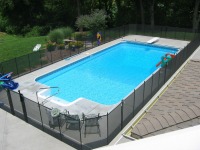On May 31, 2015, a 6-year-old girl drowned in a private pool in Virginia Beach, VA. Very little information was made public about the tragedy, but it prompted the head of the city’s Emergency Medical Services Division to share these backyard pool safety tips with the Virginian-Pilot:
- Teach every child to swim.
- Learn CPR.
- Erect a fence with a locking gate around the pool and deck.
- Never allow young children to swim alone.
- Clear all floats and toys from the water so children are not tempted to go in after them.

The U.S. Consumer Product Safety Commission provides even more detailed advice regarding what the agency calls “pool security.” It is quoted verbatim here to emphasize how important it is to keep unattended kids and inexpert swimmers away from pools while no responsible adult is nearby.
- Install a four-foot or taller fence around the pool and spa and use self-closing and self-latching gates; ask your neighbors to do the same at their pools.
- Install and use a lockable safety cover on your spa.
- If your house serves as a fourth side of a fence around a pool, install door alarms and always use them. For additional protection, install window guards on windows facing pools or spas.
- Install pool and gate alarms to alert you when children go near the water.
- Ensure any pool and spa you use has compliant drain covers, and ask your pool service provider if you do not know.
- Maintain pool and spa covers in good working order.
- Consider using a surface wave or underwater alarm.
Backyard pools are not the only site for drownings and near-drownings, but the amenities deserve special attention in Virginia Beach, where a life on the water extends well beyond the Oceanfront. Particularly as summer heats up and public schools let out on June 18, homeowners and apartment complexes with pools need to do all they can to prevent unnecessary injuries and deaths. Those efforts must include discouraging swimmers from doing things that put them at risk for suffering neck injuries and traumatic brain injuries by diving into shallow water.
At one level, protecting pool users protects property owners from settling insurance claims and paying out damages under the principle of premises liability. As a Virginia personal injury lawyer I could take several paragraphs to explain concepts like “attractive nuisance,” “contributory negligence,” and “in loco parentis.” Instead, I will just note that homeowners and business often get held liable when others get hurt or killed on their property.
The much more important reason to restrict access to pools and watch young swimmers closely is that taking those responsible actions save lives.
EJL








